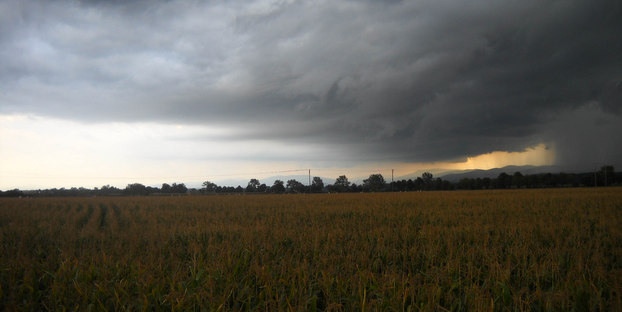
For the second straight Fall, there is bad news about barley crops. Last year started the speculation about the future of barley yields because the world’s changing climate was negatively affecting growing conditions. Combine this with the “hops doomsday scenario” and the insane California drought, and it’s starting to look like Mother Nature is a Prohibitionist.
This year, Canada — one of the largest exporters of barley — experienced some cold, wet weather that damaged the country’s barley crop.
From Reuters:
Canada was already harvesting its smallest crop since 1968, before a recent dump of snow and freezing temperatures in Alberta, the biggest barley-growing province.
The shortage will hit craft brewers the hardest, since they typically keep less malt inventory on hand than larger breweries that are also better able to absorb costs.
“Prices (going) up means our costs go up and beer prices ultimately go up,” said Neil Herbst, co-owner of Edmonton-based Alley Kat Brewery. “Any small brewery is going to be exposed.”
With supplies tight, the premium maltsters pay for high-quality malting barley has grown and that cost will pass along to brewers who are not protected by long-term supply contracts.
Be sure to read the full story for more insight into Canada’s barley problems, and how farmers are starting to shy away from growing it altogether.
Unfortunately, as you might expect, it’s not just Canada. U.S. farmers are expecting 192.7 million bushels, which would be the smallest crop in three years. Harvests in Montana, Idaho and North Dakota were devastated by pouring rains. News from Europe, the world’s largest barley producer, indicates smaller yields as well.
The climate might not seem like it’s been so much different as to hurt global barley production, but a malting barley harvest for brewing is a tempermental endeavour. The problems in the U.S. weren’t from long stretches of unseasonable weather, but from poor timing. The dry malt barley kernels need to sprout at just the right time during the malting process to produce the sugar base for alcohol. So, when ill-timed rainfall in August caused unharvested grains to germinate — voila — the crop is ruined.
Sierra Nevada Brewing Co. was forced to adjust last year after foul weather ruined its estate barley crop and forced the brewery to forgo adding its estate barley in its beers. Will be interesting to see if craft brewers are forced to adjust this year, and just how they will do it — especially when it comes to the shorter malt contracts of the craft brewing world.
In times like these, with uncontrolable weather and volatile supply/demand equations, it’s important to smartly manage your ingredient supplier relationships and strengthen your supply chain where you can. As Jeff Milligan, North American Commercial Manager of Malt at Cargill, told us last year:
“Brewers should consider ordering their base malts on a bulk basis, but it’s really a function of cost and handling,” Milligan said. “Each brewery will have a breakpoint where it makes sense to invest in a silo and receive bulk malt. Brewers will typically get discounts for ordering in larger quantity and Cargill offers silo financing options to support craft brewers as well. In general, as a brewer grows, they should be asking their maltster to provide larger packaging to improve their cost structure. Then it’s a trade-off between capital, gross investment, inventory turns, etc., balanced with flat pricing of the raw material.”
Sabine Weyermann, CEO of Weyermann Malting Co. Based in Bamberg, Germany, explained that even some large brewers do not necessarily benefit from a having their own silo. “Instead, they can take advantage of our one-metric-ton BigBags,” she said. “They provide flexibility, efficiency and product freshness. We can even custom-blend grain bills for different beer recipes and deliver them pre-mixed in BigBags for milling on location right before mashing.”
On a brew-by-brew basis, 2,000-lb. super sacks, are a fairly common option, especially for one-offs, seasonals and other special brews.
“Seasonals are probably the number one reason [for sack orders], especially if they want the malt blended and shipped in a super sack which saves them a great deal of labor, time and discarding of empty bags,” said Bob O’Connell, vice president of sales and marketing for Briess Malt & Ingredients Co., a family-owned malting company that puts the focus on producing a vast offering of specialty malt styles based in Chilton, Wis. “Milling challenges are another reason some brewers order malt for a specific brew. It’s often easier to order a pre-ground malt, especially when a variety of specialties are used in a brew, to save the time and hassle of changing mill settings.”





Bad news about this year’s barley crop http://t.co/2KvW8Rv2kq Support your local breweries, but be prepared for higher beer costs.#craftbeer
Bad news about this year’s barley crop… http://t.co/IfELnafTdr via @craftbrewingbiz
For the second straight Fall, there is bad news about barley crops. http://t.co/Euu1xezWVa
Bad news about this year’s barley crop. http://t.co/kw6O6TaheF
Stage is set for a local barley alternative:
http://t.co/sNipIa2R63 #craftbeer #barley
First hops, now this: “Bad news about this year’s barley crop.” Great story; not scared. #beer http://t.co/v0lYM5DuK1 @craftbrewingbiz
Bad news about this year’s barley crop http://t.co/DoHlezX4jF #craftbeer
Sandie Taylor liked this on Facebook.
Before the next bad news for #barley crops see how GP Analytics accurate forecasting can predict long term demands – http://t.co/fCm0D6QnmW
Kiefer VerSteegh liked this on Facebook.
April Watson liked this on Facebook.
Henrique De Luca liked this on Facebook.